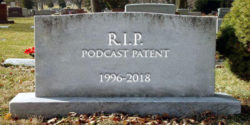The final nail in the coffin of the so-called “podcast patent troll” has been struck. Last week the Supreme Court declined the petition for review filed by Personal Audio, the company holding the original patent for “a system for disseminating media content” that it claimed applied to all podcasts. Personal Audio was challenging a 2015 ruling by the US Patent and Trademark Office that invalidated the patent. Last fall a federal appeals court upheld that ruling, which prompted the company’s failed appeal to the Supreme Court.
Personal Audio first struck fear into the hearts of podcasters in 2013 when it started contacting prominent hosts demanding royalties, filing lawsuits against Adam Carolla and CBS. Carolla later settled, and CBS lost in an East Texas courtroom where juries are known to be unusually sympathetic to the locally-based trolls filing these suits. The company’s claim was based on a 1996 patent intended to cover serialized audio delivered via cassette tape (think magazines on tape), a product that failed. The patent was later updated in 2012 to cover internet distribution, some seven years after the birth of podcasting in name and form.
Podcasters can thank the Electronic Frontier Foundation for its dogged determination to see this patent invalidated. It did so by proving to the USPTO that there existed “prior art,” in the form of serialized audio that was distributed via the internet before the original patent’s 1996 filing date. Uncovering and showing evidence of early 90s proto-podcasts from CNN and the CBC demonstrated that Personal Audio was not the author of a fundamentally original idea.
In court Personal Audio attempted to argue that the process by which any interested citizen may challenge the validity of a patent with the USPTO is unconstitutional. The EFF defended this process, and was ultimately successful.
Had there been no organized challenge to Personal Audio’s patent, or if the company had been successful in defending it, the podcasting landscape would have been negatively impacted, in all likelihood. I expect that major commercial podcast companies and public radio producers would have found some settlement that would not have inhibited the creation of “Serial” and subsequent hit shows.
The effect would have been most profound on small and independent producers. Having to pay a royalty – any royalty – just to distribute audio programs online certainly would have discouraged countless people from starting a podcast. Maybe some folks would have gone to YouTube, or maybe others would’ve kept their heads down, figuring Personal Audio wouldn’t be able to catch everyone, especially the smallest of minnows in the podcasting sea.
Nevertheless, I’d bet just the plausible threat of getting a nasty letter in the mail from Personal Audio’s lawyer would have been enough discouragement for too many producers, especially those with fresh ideas coming from less privileged communities and backgrounds.
I liken this to what actually happened to independent internet radio stations in the U.S., when the performance royalties they pay to record labels skyrocketed by 10x or more in 2016, with the expiration of the Webmaster Settlement Act. This caused untold dozens of small broadcasters to shut down, leaving the world of internet radio poorer, and less diverse, as a result.
Podcasting, too, would have been much poorer had Personal Audio’s patent won the day.
Luckily, we now live in a universe where there is no patent on podcasting. As a podcaster (and listener) I say thanks again to the EFF.



